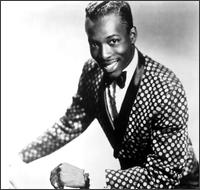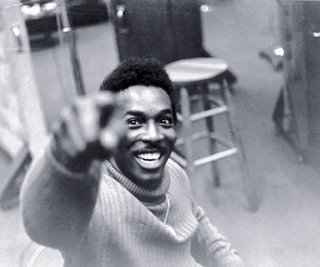In Memoriam: Wilson Pickett

When guitarist Duane Allman, then a session musician at the legendary Fame studios in Alabama, approached Wilson Pickett about covering the Beatles "Hey Jude," the soul legend's response was "Skyman, that ain't for me. It's too weird." Considering Pickett's reputation at the time, it might have been natural for the legend to have some doubts about covering Lennon and McCartney's triumphant masterpiece. Wilson "Wicked" Pickett, was the dark side of soul, Hell's very own preacher. Whereas Otis Redding's quavering screams implored his listeners to try a little tenderness, Pickett's throaty growls were pure evil. As Pickett himself recalls, "Early one morning I ran out and hollered. My voice echoed down through the swamps and I thought 'Uh-oh. This is it.'"
Like most of the great soul singers of the sixties, Pickett started out on the gospel circuit. As a teenager, Wilson traveled across the South, adding his ferocious vocals to troupes featuring the likes of the David Sisters, the Soul Stirrers, and the Swan Silvertones. Jamming with Sam Cooke, Little Archie, and his idol, the Rev. Julius Cheeks, young Wilson realized that his voice, and especially, the "Scream," was something special. And when Sam Cooke and Aretha Franklin successfully (and more importantly, lucratively) made the switch to secular music, Pickett decided to follow suit. Wilson was born in 1941 in Alabama and worked hard picking cotton --two days in school, three days in the fields. Although he moved with his father to Detroit in 1955 to find a better life, he remained in deep poverty. Secular music presented Wilson with an opportunity to use his amazing gift and provide a living for himself and his family.
Wilson's commerical singing career started when he teamed up with the Falcons in Detroit. The Falcons featured Eddie Floyd, a future soul legend in his own right, and with Wilson on vocals scored a hit with "I Found A Love," a gospel-influenced lament that reached #6 on the R&B charts. While still with the Falcons, Pickett started recording solo sides and sent a demo version of "If You Need Me" to Jerry Wexler of Atlantic Records. Wexler loved the song, but decided to give it to Solomon Burke, crushing Pickett's aspirations.
But Wilson Pickett was not going away. "You couldn't fight the power in his voice," said Floyd. "Wilson was so aggressive, he wasn't going to be denied." Wilson's single "It's Too Late," --featuring the kind of spoken word interlude that Joe Tex would later become famous for-- reached #7 on the charts and Wexler took notice, buying out Pickett's contract. After misfiring with the syrupy "Come Home Baby," a duet with Tammi Lynn in which producer Bert Burns stripped all the poison out of Wilson's voice, Wexler sent Pickett down to his hit factory--Memphis's Stax Records.
 At that time, almost everything Stax touched turned to gold, and Wilson Pickett was no exception. Reunited with Eddie Floyed, who now worked as the chief songwriter and producer, and introduced to the talents of Stax guitarist Steve Cropper, Pickett crafted some of his best known hits. The three men secreted themselves away in the Lorraine Hotel--the very same hotel where Martin Luther King would be assassinated some three years later--and emerged with "Don't Fight It," "634-5789," and the smash hit "In The Midnight Hour." Pickett was involved in all aspects of the process. "I wasn't just a voice. I had to be in on everything. The songwriting, the arranging, the producing. We did it all. Together. Live. What you hear is what happened when I stepped to the mike. Can't get no soul reading from a sheet of paper."
At that time, almost everything Stax touched turned to gold, and Wilson Pickett was no exception. Reunited with Eddie Floyed, who now worked as the chief songwriter and producer, and introduced to the talents of Stax guitarist Steve Cropper, Pickett crafted some of his best known hits. The three men secreted themselves away in the Lorraine Hotel--the very same hotel where Martin Luther King would be assassinated some three years later--and emerged with "Don't Fight It," "634-5789," and the smash hit "In The Midnight Hour." Pickett was involved in all aspects of the process. "I wasn't just a voice. I had to be in on everything. The songwriting, the arranging, the producing. We did it all. Together. Live. What you hear is what happened when I stepped to the mike. Can't get no soul reading from a sheet of paper."It would be fun to speculate what other classics might have emerged from the Stax-Pickett collaboration. But unfortunately, Stax owner Jim Stewart decided to ban all outside artists from the studio. So Wexler shipped Wilson off to the next most logical destination--Muscle Shoals, located in Pickett's home state of Alabama. Like Stax, Muscle Shoals was known for teaming up exciting singers with its magnificent house band, mostly composed of hillbilly white musicians. When Wilson arrived at Fame studios in 1966, he reportedly stepped off the plane only to see blacks picking cottons in the fields surrounding the airport. He wanted to turn right around and get on the plane, but fortunately he didn't. The Muscle Shoals sessions led to the grooving "Mustang Sally," and the chart-topping dance dictionary, "Land Of 1000 Dances"--which of course contains the most famous use of the word "na."

But perhaps the biggest surprise from the Muscle Shoals era was Wilson's cover of "Hey Jude." Wilson was criticized in some circles as being a less polished, and some would say, less versatile singer than contemporaries Otis Redding and Aretha Franklin. But with Allman's exhortations, Wilson was able to channel his muscular vocals and make "Hey Jude" his own. His vocal performance was both powerful and tender, in control and explosive, a worthy testament to the man who would begin each morning with a primal scream, a man who's voice, in the words of Stax trumpeter Wayne Jackson, "had that spark of insanity, that ability to transfer a slice of his soul to tape."
sources: Leo Sacks, Peter Guralnick, Richie Unteberger
Technorati Tags: music, soul, wilson pickett,
celebrity


<< Home